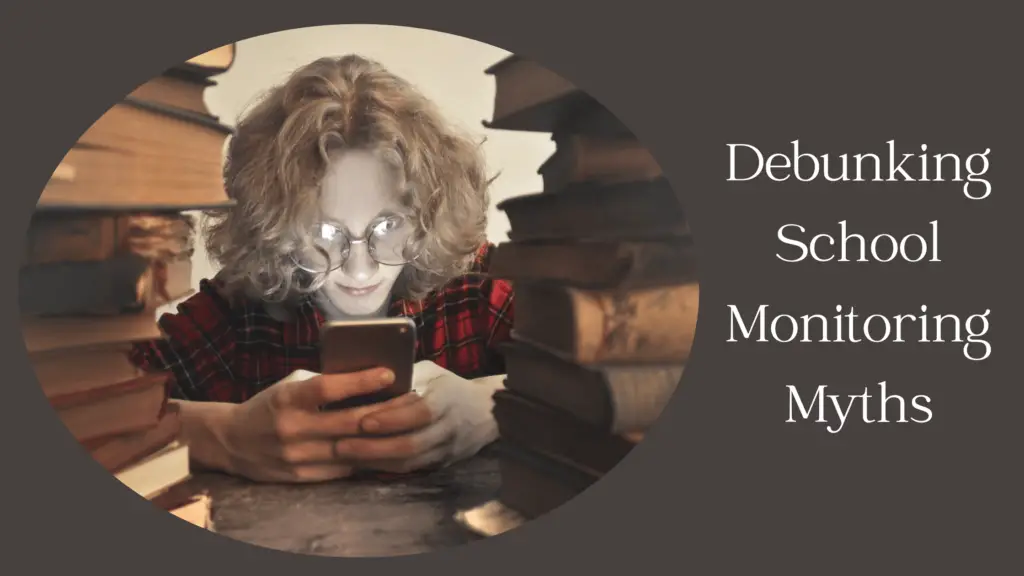In the age of digital education, concerns about online privacy have become more pronounced than ever. Even students themselves are being aware of how not being careful in the online space can pose a great risk. At times students as well as employees get to wonder if their internet history is safe from the school admin and employers respectively. This is who student tend to wonder: can your school see your internet history at home.
Can Your School See Your Internet History At Home
Addressing the common concern of whether your school has visibility into your internet history at home – can your school see your internet history at home – the answer is generally no. Your school’s capacity to view your internet history remotely is limited, primarily applying to devices or networks under school management or surveillance. While schools possess the ability to monitor internet activities on devices linked to their network while within campus premises, they typically lack access to the internet history of devices connected to external networks, such as your home setup.
Nevertheless, it’s worth recognizing that schools do have the capability to implement diverse software solutions and security measures to effectively manage and monitor devices provided by the school or those utilized within their network infrastructure. These measures ensure a controlled and secure learning environment while also enhancing digital safety practices.
Therefore, whether or not your school can see your internet history at home depends on a few factors, including:
- The device you are using. If you are using a school-issued device, even if you are using it at home, the school may be able to see your internet history. This is because the school has control over the device and its settings.
- The software you are using. If you are using software that is provided by the school, such as a school-issued laptop or a school-provided app, the school may be able to see your internet history, even if you are using it at home. This is because the school has control over the software and its settings.
Understanding School Monitoring Systems
To grasp the nuances of school monitoring, it’s important to acquaint yourself with the tools commonly employed by educational institutions to oversee online activities. These tools, often designed with safety and educational objectives in mind, collectively form the framework through which schools maintain a secure online environment for their students.
Content Filters and Firewalls
Content filters and firewalls are foundational components of a school’s online monitoring strategy. They work by preventing access to websites deemed inappropriate, distracting, or unrelated to educational purposes. These filters, managed by the school’s IT department, act as gatekeepers to ensure that students’ online experiences align with the institution’s educational goals.
Mobile Device Management (MDM) Software
For schools that provide students with devices, Mobile Device Management (MDM) software proves invaluable. This technology empowers administrators to remotely manage and monitor devices, granting them a degree of control over app installations, settings, and overall device usage. MDM also allows schools to locate devices in case of loss or theft.
Virtual Private Networks (VPNs) on School-Provided Devices
In some cases, schools may utilize Virtual Private Networks (VPNs) on devices provided to students. A VPN creates a secure and encrypted connection, offering protection against potential cyber threats. While VPNs enhance security, it’s essential to recognize that this practice is typically confined to devices owned or managed by the school.

Scope of Monitoring
Navigating the scope of monitoring involves discerning the boundaries within which schools monitor online activities. Distinguishing between on-campus and off-campus monitoring is vital for understanding the extent to which your online privacy is affected.
When using school-issued devices or connecting to the school’s network, students enter an environment where monitoring is more pronounced. Schools employ these measures to maintain discipline, deter access to unsuitable content, and ensure that digital interactions align with educational goals.
Once outside the school premises, the dynamics of monitoring change. Personal devices and internet connections fall beyond the direct purview of the school’s monitoring systems. Legal and ethical considerations underscore the limitations of monitoring students’ activities beyond the classroom, affirming the sanctity of personal privacy.
Monitoring at Home: What’s Possible?
A prevailing question among students pertains to the extent to which schools can access internet history conducted in the privacy of one’s home. By exploring the technical and ethical dimensions of this issue, we can gain a more nuanced understanding.
From a technical standpoint, schools encounter significant hurdles when attempting to access internet history on personal devices beyond their network. The encryption protocols, privacy settings, and individual device security mechanisms combine to form a formidable barrier against unsanctioned access.
The distinction between school-provided devices and personal devices plays a pivotal role in determining the extent of monitoring. On devices owned by the school, such as laptops or tablets issued to students, monitoring might be more feasible due to administrative control. However, on personal devices, monitoring becomes more intricate due to legal constraints and privacy considerations.

How Often Do Schools Check Search History?
The frequency of schools checking search history is not uniform and can vary significantly. This variation is influenced by factors such as the school’s policies, resources allocated to monitoring, and the overall digital safety priorities of the institution. Some schools might conduct sporadic checks, while others may emphasize continuous vigilance.
Can My School See My Search History After It Has Been Deleted?
The notion of deleted search history is worth dissecting. When you delete your browsing history, you initiate a process that typically erases visible traces of your online activities. However, it’s worth acknowledging that data recovery processes, particularly within a managed device environment, might uncover remnants of deleted data. Schools with advanced technical capabilities might be capable of restoring portions of deleted internet history.
Therefore, it is possible for your school to see your search history after it has been deleted, depending on how your school’s internet filtering and monitoring system is set up. For example, if you are using a school-issued device or are connected to the school’s WiFi network, the school may have the ability to see your browsing history, even if you have deleted it. This is because the school has control over the device or network and can access the data that is stored on it.
Can Your School See Your Search History on Your Phone?
The boundary between school oversight and personal privacy becomes especially pertinent when considering personal smartphones. The capacity for schools to monitor activities on personal smartphones hinges on whether the device is school-provided and the mechanisms in place for monitoring. On personal devices, the intersection of privacy rights and monitoring responsibilities presents intricate challenges.
Read About: How to Get Birth Control Without Parents Knowing
Can My School See What I Do on My Phone at Home?
Contemplating the possibility of schools monitoring activities on personal phones at home elicits important legal and ethical questions. While schools have an inherent responsibility to foster a secure learning environment, the privacy rights of students extend beyond school boundaries. Balancing these two imperatives requires thoughtful consideration.
Hence, although not necessarily, it is possible for your school see what you do on your phone at home. Especially if you are using a school-issued device, if you are using apps that are provided by the school and if the school has installed software on your device.
Can My School See My Search History on Incognito Mode at Home?
Incognito mode, often misconstrued as an impenetrable cloak of privacy, deserves closer examination. While this mode prevents browsers from saving your browsing history, cookies, and site data, it doesn’t render you completely invisible. Advanced network tracking tools and the school’s network infrastructure might still provide avenues for monitoring, especially when using school-provided devices or networks.
Can My School See My Search History on My School Account?
When logged into your school account on a device, there’s a potential that certain aspects of your activity could be accessible to the school. This is particularly relevant if the school possesses administrative access to these accounts. It’s prudent to recognize that using your school account on a personal device could potentially expose elements of your activity to monitoring.
Can Teachers See Your Search History on Your School Account?
While teachers and administrators may have access to certain information related to your school account, direct access to your search history might be less common. Any access granted to student data is typically circumscribed by institutional policies and legal frameworks designed to safeguard student privacy.

How Long Do Schools Keep Your Search History?
The retention period for search history can vary significantly between institutions. Factors such as institutional policies, legal obligations, and the intended purpose for collecting data play pivotal roles in determining how long your search history is retained. Some schools might prioritize data deletion after a certain period to uphold privacy like six months, while others may retain data for an extended duration even up to five years.
Student Privacy Rights
It’s paramount to be cognizant of your rights as a student when it comes to online privacy. The Family Educational Rights and Privacy Act (FERPA) is a federal law that underscores the importance of safeguarding student education records and personal information. FERPA empowers students with certain rights regarding access, disclosure, and control over their data.
Striking a balance between ensuring students’ safety and respecting their privacy is an intricate challenge. Schools are entrusted with fostering a secure educational environment, and monitoring forms a part of this endeavor. However, institutions must also be cognizant of the need to uphold students’ individual rights to privacy even as they strive to ensure digital well-being.
Read About: How to Convince Your Parents to Get You a Phone
Protecting Your Personal Privacy
While schools bear the responsibility of ensuring online safety, students also play a pivotal role in safeguarding their personal privacy:
- Secure and Private Browsers: Utilize browsers equipped with robust security and privacy features to shield your online activities from prying eyes.
- Virtual Private Networks (VPNs): Employ VPNs on personal devices to encrypt your internet traffic and enhance your online privacy.
- Educate Yourself: Equip yourself with knowledge about privacy settings, online security measures, and best practices to fortify your digital footprint.
Conclusion
In an era dominated by the digital landscape, inquiries about online privacy are not only valid but essential. As students, educators, and institutions navigate the intricacies of school monitoring systems, it’s crucial to grasp the nuances that define the boundaries of monitoring. While schools employ tools to ensure online safety, the realm of personal privacy remains an equally vital concern.







